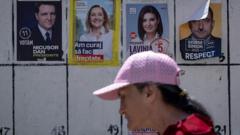As Romania heads to the polls amid heightened scrutiny, the role of TikTok influencers in political manipulation raises alarm about election integrity.
### TikTok Under Fire as Romanian Election Scandal Unfolds

### TikTok Under Fire as Romanian Election Scandal Unfolds
Accusations against social media influencers and foreign interference disrupt Romania's electoral process.
In an unprecedented political storm, Romania finds itself on the brink of re-elections after the shocking annulment of presidential elections last December, which sparked protests nationwide. The center of tension lies with Calin Georgescu, a far-right candidate whose unexpected initial victory was overturned due to allegations of Russian meddling and manipulation by TikTok influencers. Authorities claim his success was buoyed by a network of influencers promoting content favoring him without proper disclosure, raising red flags about the influence of social media in politics.
Georgescu's ban from running again follows serious charges, including attempting to undermine constitutional order – accusations he refutes, claiming they are fabricated to invalidate his electoral win. On the upcoming ballot, George Simion, the leader of Romania’s AUR party, emerges as the pre-election favorite, closely trailed by Crin Antonescu and Nicușor Dan.
The role of TikTok in Georgescu's rise cannot be overlooked. Initially polling relatively low, Georgescu gained momentum through viral content, showcasing lifestyle elements that resonated with voters, including traditional Romanian attire and judo. Expert analyses suggest that his ascendance was largely orchestrated through synthetic engagement on the platform, perpetrated by over a hundred paid influencers and a network of bot accounts amplifying pro-Georgescu content.
Despite repeated assertions from Romanian authorities about Russian interference—echoed in declassified reports pinpointing cyberattacks and disinformation tactics—the evidence remains elusive, leaving many Romanians frustrated and questioning the authenticity of these claims. Social media appears to have been instrumental, with reports of influencers participating in campaigns under the guise of promoting "stability" without declaring any ties to specific candidates.
As the fallout continues, reports emerged indicating that a prominent influencer known as the "King of TikTok," Bogdan Peschir, was arrested amidst allegations of attempting to corrupt voters electronically through substantial gifts to influencers. These payments, reportedly exceeding $900,000, have blurred the lines between influencer marketing and electoral manipulation, highlighting the challenges in regulating social media's impact on democratic processes.
The investigation into these claims is ongoing, with the European Commission and Romanian judicial bodies closely monitoring the case. However, with little concrete evidence to substantiate allegations of Russian interference, the lasting implications for Romania's political landscape remain uncertain, raising pressing questions about social media ethics and electoral integrity.
Georgescu's ban from running again follows serious charges, including attempting to undermine constitutional order – accusations he refutes, claiming they are fabricated to invalidate his electoral win. On the upcoming ballot, George Simion, the leader of Romania’s AUR party, emerges as the pre-election favorite, closely trailed by Crin Antonescu and Nicușor Dan.
The role of TikTok in Georgescu's rise cannot be overlooked. Initially polling relatively low, Georgescu gained momentum through viral content, showcasing lifestyle elements that resonated with voters, including traditional Romanian attire and judo. Expert analyses suggest that his ascendance was largely orchestrated through synthetic engagement on the platform, perpetrated by over a hundred paid influencers and a network of bot accounts amplifying pro-Georgescu content.
Despite repeated assertions from Romanian authorities about Russian interference—echoed in declassified reports pinpointing cyberattacks and disinformation tactics—the evidence remains elusive, leaving many Romanians frustrated and questioning the authenticity of these claims. Social media appears to have been instrumental, with reports of influencers participating in campaigns under the guise of promoting "stability" without declaring any ties to specific candidates.
As the fallout continues, reports emerged indicating that a prominent influencer known as the "King of TikTok," Bogdan Peschir, was arrested amidst allegations of attempting to corrupt voters electronically through substantial gifts to influencers. These payments, reportedly exceeding $900,000, have blurred the lines between influencer marketing and electoral manipulation, highlighting the challenges in regulating social media's impact on democratic processes.
The investigation into these claims is ongoing, with the European Commission and Romanian judicial bodies closely monitoring the case. However, with little concrete evidence to substantiate allegations of Russian interference, the lasting implications for Romania's political landscape remain uncertain, raising pressing questions about social media ethics and electoral integrity.






















